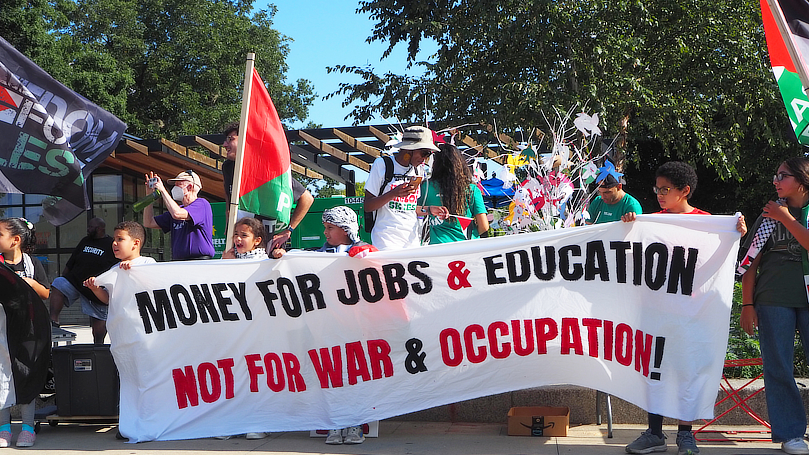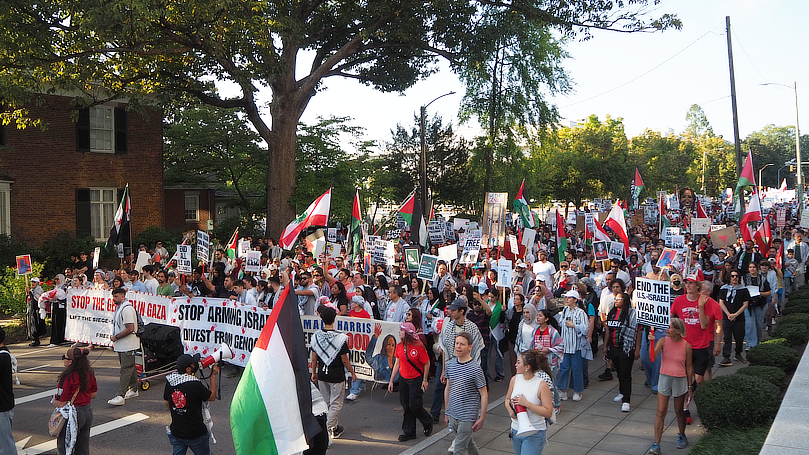
Earlier this month, Palestine solidarity groups in North Carolina held two days of events with folks across the state. The actions marked one year since the start of the U.S.-backed Israeli genocide in Gaza and war in Lebanon.
That Saturday, over 1,000 people participated in a statewide rally in Raleigh, sponsored by an assortment of Palestinian solidarity and progressive organizations. The following day, the group held a panel on the healthcare crisis in Gaza, led by healthcare professionals who were closely linked with the struggle in Gaza, including some who traveled abroad to provide medical services.
Both events highlighted the death toll in Gaza and Lebanon, which includes more than 43,000 people killed and over 101,000 people injured in Gaza, as well as over 2,700 people killed in Lebanon. Naturally, both events condemned the Zionist apartheid regime in Israel for its genocide and war crimes, as well as honored the Palestinian and Lebanese fight for national liberation.
Statewide Rally
The sun was beating down on Moore Square as as rows of marching protestors burst into the park, joining hundreds of other activists wearing Palestinian keffiyehs and flying dozens of flags for Palestine and Lebanon. The rally started with a fiery call and response of different pro-Palestine chants in both English and Arabic. The speakers included Palestinian and Lebanese citizens as well as community organizers.
Speakers called for a ceasefire and recounted the statistics of the genocide, while others condemned imperialism’s complicity, calling out the U.S. politicians who have sent $18 billion in military aid, as well as the big business media conglomerates who have spread lies on Israel’s behalf. Multiple people spoke about how easy it was for the U.S. government to support funds for Israel, but failed to provide needed supplemental funding for FEMA, even while the southeast suffers from the effects of Hurricane Helene. (That additional disaster relief funding was a casualty of GOP negotiators who refused to include it in the stopgap bill passed at the end of September.)
One of the speakers included Imam Hisham Sarsour, who highlighted a laundry list of lies from the Israeli government, including the allegation of “mass rape and beheading babies” (both claims which have no evidence), and documented Israel’s targeting of key infrastructure including schools, hospitals, water treatment plants, mosques, churches, and even cemeteries.
Lebanese activist Rania Masri, who had mentioned the struggle of the people in Appalachia due to the hurricane said, “We are watching the most well documented genocide in human history.” After referencing the recent Lancet study that estimated the death toll using “indirect deaths,” placing the death total at approximately 186,000, Masri claimed, “there could be 300 to 500,000 dead in Gaza.”
Gaza Healthcare Forum
On Sunday evening, 50 people filled into the Northern Raleigh Mosque’s gym to learn about the healthcare crisis going on in Gaza. Like the rally, the event was co-sponsored by many Palestine solidarity groups, including Healthcare Workers for Palestine. In addition to a call to end the occupation of Gaza and the West Bank, an organizer from Muslims for Social Justice linked U.S support for Israel’s genocide to the U.S.’s own history of genocide and slavery.
The keynote speaker of the panel was Rocky Mountain orthopedic surgeon, Mark Perlmutter, who is the president of the World Surgical Foundation and has traveled around the globe to help those hit by disasters. Perlmutter traveled to Gaza to provide medical treatment and deliver much needed medical supplies after feeling guilty that “our tax dollars are going to kill civilians” — a fact he mentioned multiple times during his talk.
“Most of the patients that came in were children. There would be five kids to a gurney,” he said. When recounting children arriving in the ER he said, “30% show up dead, 30% die in front of you, and of the 30% that make it to the operating room, 90% of them die.”
Later, he spoke about the mental effects on doctors dealing with the devastation, stating, “I’ve seen more pain than probably everyone in this room combined, and I still have nightmares at night about those kids.”

Perlmutter’s sentiments were echoed by another panelist, Dr. Ayaz Pathan, who is an emergency medicine physician. Pathan agreed with the mortality of children and pointed to Israel targeting dialysis and radiology centers as evidence of genocide, saying, “They didn’t bomb them — they burned the rooms and the equipment,” so that people would have to die slowly.
Perlmutter also had plenty of words to say about the complicity of the capitalist media, calling them “blind,” noting that some reporters are trying, but editors “hack it up.” He told the story of a candid conversation he had with one reporter following a live interview. The reporter asked him off camera what he thought the problem was with providing coverage of the real situation. Perlmutter bluntly replied, “Dumby, you’re not allowed in the country. That’s the story!” Reflecting on the role he and his fellow doctors played as those solely responsible for recording the death and destruction, he noted, “We didn’t realize until we left that we were the journalists.”
Another panelist, Israa Al-Sayyed, who is a physician assistant and Palestinian-American with family in Gaza and the West Bank, traveled to Egypt to aid Palestinian refugees who were evacuated for medical treatment. She tried going to Gaza but was not allowed, likely because of her Palestinian heritage. Like Perlmutter, Al-Sayyed recounted countless tragedies of Palestinians, especially children, suffering from permanent handicaps caused by bombs, including young children. She also recalled children under the age of 12 speaking about their younger siblings being martyred.
Al-Sayyed highlighted the high level of security at the hospitals, where they would check luggage and do pat downs. One boy told her at the hospital, “I left one prison only to enter another.” Al-Sayyed also put attention on the lack of opportunities for Palestinians, even if they are able to escape Gaza. “Being in a hospital is often a form of housing,” she said, before noting that some refugees are paying up to $10,000 to get into Egypt. And still, many who manage to arrive there struggle to get access to reliable health care and resources.
Panelist Asma Abu-Dahab, a psychotherapist, echoed this sentiment. “Getting evacuated does not mean they are saved.” She noted that Arab people in the region try their best to help, but “the system is not helpful.”
Having provided telehealth therapy and social work, Abu-Dahab started her section off with a basic question: “How can you explain [the genocide] to children?” Especially hard to explain is why so few countries are fighting to help stop Israel’s bombs. Meanwhile, children are losing faith in all adults and showing regressive behaviors. Abu-Dahab summarized it by saying, “People are being diagnosed with anxiety and depression, but that’s just a normal response [to a genocide].”
Questions for Harris
The two events had distinctly different atmospheres. The rally had feelings of optimistic resistance, while the healthcare panel was a solemn reality check. The most prominent contradiction between the events was the willingness to speak out against the Biden-Harris administration.
At the rally on Saturday, a range of speakers variously called for voting, applying pressure with your vote, or organizing to withhold your vote. Overall, electoral politics was seen as a viable tactic to use to effect policy change and to use mass movements as part of the electoral struggle.
On Sunday’s panel, Perlmutter hoped on multiple occasions for a Harris election win, even going as far as saying he believes she will move away from being a staunch Pro-Israel ally once the election is over and the pressure from AIPAC wears away. He admitted that there wasn’t a better option between Harris and the more pro-Israel Trump, while rightly saying that the U.S. could stop the genocide immediately by refusing to send arms to Israel.
As the election draws near, there are countless questions surrounding the multiple wars being waged by Israel in the Middle East. The U.S. has the ability to achieve a ceasefire deal, but it is looking less and less likely as Israel seeks to escalate the conflict. Tactically, however, should this race come down to a narrow margin like many expect, wouldn’t it be better for Harris to give real support to achieving a ceasefire — and get the votes that would come with it — by supporting an arms embargo? That said, even if the Biden-Harris administration does secure a ceasefire, to quote Al-Sayyed during the panel, “A ceasefire is only the beginning of peace.”
Images: Bailey Jack / CPUSA


 Join Now
Join Now